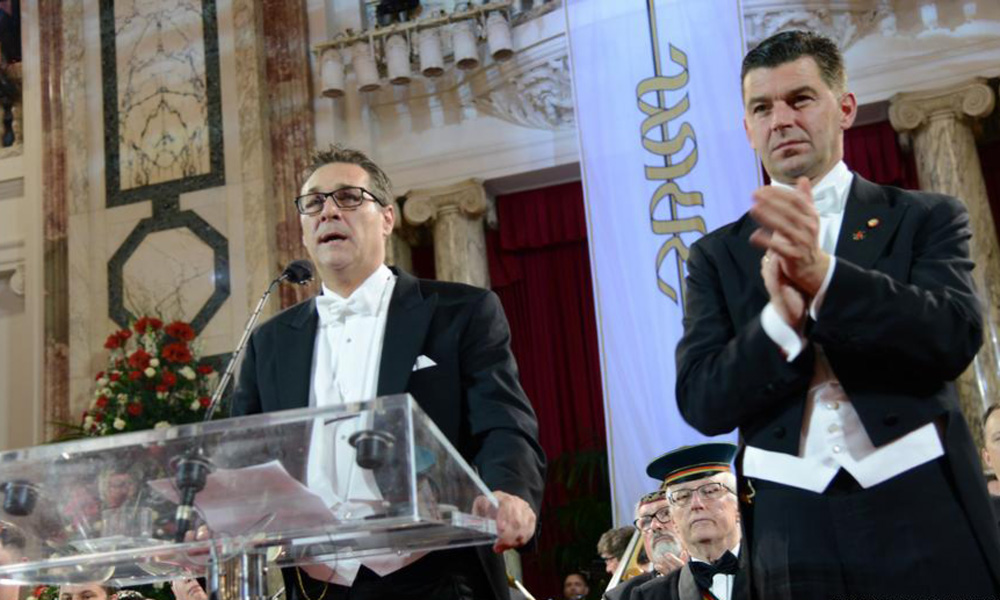In January, Austria’s Freedom Party (FPÖ) hosted its annual Academics Ball, where women in gowns and men in tuxedos and three-piece suits dance and socialize in Vienna’s splendorous imperial palace. Attendees also proudly dress in the colors and regalia of their Burschenschaften—student fraternities founded during the 19th century, some of which espouse pan-Germanism. Once described as a “networking event” for the European far-right, this year’s gala drew 8,000 anti-fascist demonstrators to the streets. Inside the hall, Freedom Party leader and Austrian vice-chancellor, Heinz-Christian Strache—the second-most-powerful man in government—addressed the partygoers: “Anti-Semitism, totalitarianism [and] racism are the opposite of fraternity thinking,” he said.
The FPÖ’s return to government in December 2017 as the junior partner in a coalition with the center-right People’s Party was viewed as a shift to the right—part of a pan-European trend that has empowered nationalist, anti-immigration parties in Poland, Hungary and Italy. Founded in the 1950s by former Nazi functionaries, the FPÖ has historically represented the so-called Third Camp in Austrian politics: a mix of nationalism, liberalism and German-ethnocentricity. The party played a minor role in Austrian politics until the 1990s, when under the flamboyant provocateur Jörg Haider’s leadership, it became an anti-EU, anti-immigration party, and its vote share exploded. In 2000, the party was strong enough to form a coalition with the center-right People’s Party despite Haider’s praise of the Third Reich and Waffen-SS and his description of the Mauthausen concentration camp as a “punishment center.”
When Strache became FPÖ leader in 2005, he expanded the party’s anti-Muslim message, which became even more strident during the 2015 refugee crisis. At the same time, he “tried to change the image of the FPÖ from an extreme-right party to a moderate conservative one,” explains Austrian political scientist Anton Pelinka. Strache took a friendlier line toward Israel, making multiple visits, including a controversial trip to Yad Vashem in 2016, and has made efforts to distance the FPÖ from anti-Semitism, Holocaust denial and neo-Nazism. In addition to his speech at the Academics Ball, he deleted an anti-Semitic cartoon (posted in 2012) from his Facebook page and has argued that the far-right Aula magazine is no longer an “organ” of the FPÖ.
But some Austrians believe these changes are rhetorical or superficial. “You can say the FPÖ has become stricter in terms of sanctioning” anti-Semites, says Bernhard Weidinger, a researcher at the Austrian Resistance Documentation Center. But “there is still much to be done.” There have been 38 reported incidents of “extreme-right activity” within the FPÖ since December 2017—including anti-Semitism—according to a report published in June by Austria’s Mauthausen Committee (MKÖ). Such incidents have “increased in the last year and they have also increased since the [FPÖ returned to] government,” says Christa Bauer, the MKÖ’s managing director. In April, for example, the party’s Chief Whip Johann Gudenus launched an attack on George Soros, claiming he was responsible for mass migration to Europe.
Weidinger says the FPÖ retains its links to the pan-Germanist scene from which the party was born through the Burschenschaften, which play a large role in the party in terms of both personnel and policy. In 2011, a clause specifying a “commitment to a German people and cultural community” was reintroduced to the party manifesto, he says. There also remain members of Burschenschaften “that think Austria is still a part of Germany,” says Nina Horaczek, lead reporter for the investigative weekly Falter. “Some of them still have maps up in their meeting rooms where you see the old German Reich [including] parts of Poland and Austria and they still sing these songs that Austria is part of Germany.”
Austria’s Jewish community views the FPÖ with suspicion. Since the coalition government was formed in 2017, the Jewish community of Vienna has not worked with FPÖ ministers and members of parliament and has cooperated only with chancellor Sebastian Kurz’s People’s Party. In a speech at Holocaust commemorations at Mauthausen in May, Oskar Deutsch, president of Vienna’s Jewish community, said that the FPÖ constituted the “political arm” of the Burschenschaften, who are the “successors to the precursors of the Nazis” in Austria.
The Austrian situation, therefore, is distinct even from Poland, Hungary and Italy, where hostility towards the EU, Islam and asylum seekers has also enabled the rise of far-right populism. It is not that Jews and liberals are afraid the Nazis are coming back, argues Pelinka, and it would be wrong to call the 26 percent of voters who voted for the FPÖ in the 2017 elections Nazis. But while the FPÖ has undergone cosmetic changes to its image, including becoming pro-Israel, beneath the surface, observers argue, this party first led by an ex-SS officer retains, through its fidelity to the Burschenschaften, tangible links to hard-right, pan-Germanist elements in society. Although the leadership of the mainstream political parties has come to terms with the awful realities of Austrian history and stands clearly against anti-Semitism, Deutsch has argued, the FPÖ has not, and does not.
Liam Hoare is Moment’s Europe Editor.


Since hate crimes are generally underreported in the EU, the real figures on anti-Semitism in these and other EU states are likely to be much higher.